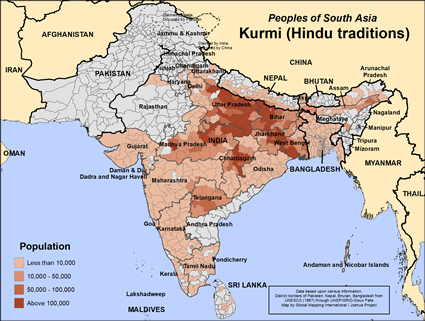Kurmi (Hindu traditions) in Nepal

Photo Source:
Anonymous
|

Map Source:
People Group data: Omid. Map geography: UNESCO / GMI. Map Design: Joshua Project.
|
| People Name: | Kurmi (Hindu traditions) |
| Country: | Nepal |
| 10/40 Window: | Yes |
| Population: | 240,000 |
| World Population: | 19,671,000 |
| Primary Language: | Bhojpuri |
| Primary Religion: | Hinduism |
| Christian Adherents: | 0.03 % |
| Evangelicals: | 0.00 % |
| Scripture: | Complete Bible |
| Ministry Resources: | Yes |
| Jesus Film: | Yes |
| Audio Recordings: | Yes |
| People Cluster: | South Asia Hindu - Kurmi |
| Affinity Bloc: | South Asian Peoples |
| Progress Level: |
|
Introduction / History
The Kurmi are believed to be descendants of some of the earliest Aryan immigrants to India, originating from the Kshatriya (warrior caste) who later became farmers. Kurmi are known in India as the chief agricultural caste.
What Are Their Lives Like?
Modern Kurmis are relatively prosperous and educated. Their lifestyle is associated with farming and trading. Due to their agricultural link, the Kurmi are viewed as one of the 'backward' or lower castes. Some Kurmi have formed a national movement in the northern and eastern Indian regions to advocate for their interests.Girls among the Kurmi receive education up to the primary level, while boys are encouraged to study further.
What Are Their Beliefs?
The Kurmi are Hindu and worship Ram, Shankar, Hanuman, Vishnu, Niranjan, Nagdeo, and other deities.
What Are Their Needs?
Much spiritual darkness and opposition to the Gospel is found throughout South Asia. Only the Lord can bring light to the darkness.
Prayer Points
A few Kurmi in Nepal have reported themselves as Christians to the census. Pray that these people will honor the Lord by the way they live their lives and will be a shining testimony to others in their community.Pray there will be many interactions with true believers everywhere they live who will obey the prompting of the Holy Spirit to share Christ with them.Pray for a family-based movement to Christ among the Kurmi community in Nepal.